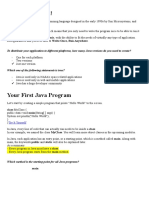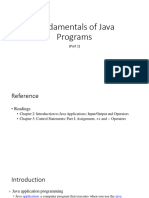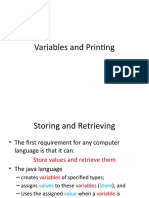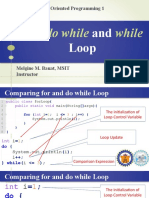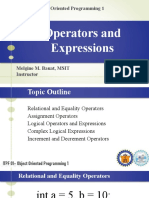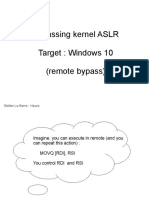0% found this document useful (0 votes)
76 views16 pagesDimentary Java 1
This document provides an overview of introductory Java programming concepts including:
- The main method is executed first when running a Java program. Code is placed within methods and classes.
- Variables are named locations in memory that contain data of a specified type like int or String.
- Java uses primitive data types to store values and identifiers to name classes, methods, and variables.
- Comments are used to explain code and are ignored by the compiler. Single-line comments begin with // and multi-line comments begin and end with /* and */.
Uploaded by
Christian Joseph GuillasperCopyright
© © All Rights Reserved
We take content rights seriously. If you suspect this is your content, claim it here.
Available Formats
Download as PPTX, PDF, TXT or read online on Scribd
0% found this document useful (0 votes)
76 views16 pagesDimentary Java 1
This document provides an overview of introductory Java programming concepts including:
- The main method is executed first when running a Java program. Code is placed within methods and classes.
- Variables are named locations in memory that contain data of a specified type like int or String.
- Java uses primitive data types to store values and identifiers to name classes, methods, and variables.
- Comments are used to explain code and are ignored by the compiler. Single-line comments begin with // and multi-line comments begin and end with /* and */.
Uploaded by
Christian Joseph GuillasperCopyright
© © All Rights Reserved
We take content rights seriously. If you suspect this is your content, claim it here.
Available Formats
Download as PPTX, PDF, TXT or read online on Scribd
/ 16















